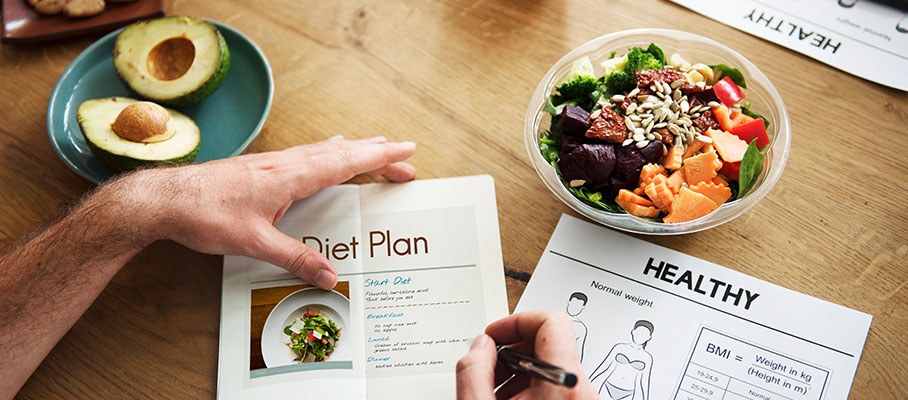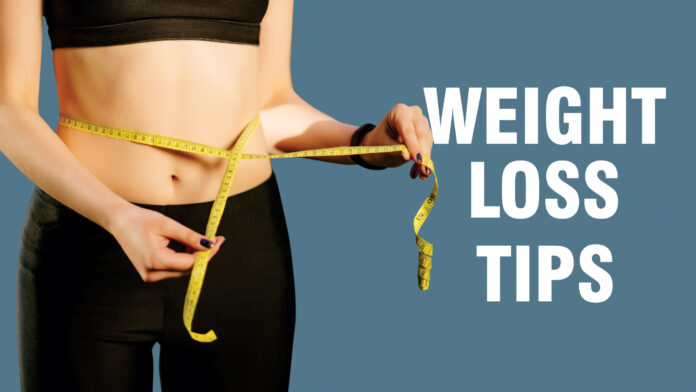Embarking on a weight loss journey can seem daunting, but it doesn’t have to be a grueling task. A holistic approach to weight loss focuses on sustainable practices that improve your overall health, rather than quick fixes that may not last. Achieving and maintaining a healthy weight involves both dietary changes and lifestyle adjustments, fostering a harmonious relationship with your body and mind.
Our guide provides 12 simple, easy-to-follow tips for weight loss journey. Each tip is designed to promote balance, improve nutrition, and foster a positive, healthy lifestyle. Remember, weight loss isn’t solely about reaching a specific number on the scale, but rather about nurturing a healthier, happier you. Let’s take the first step together towards sustainable weight loss.

1. Create a Calorie Deficit
Creating a calorie deficit is the first crucial tip for weight loss. This means consuming fewer calories than your body burns in a day. It doesn’t have to be drastic – a deficit of 500 calories per day can lead to a healthy weight loss of 0.5-1 pound per week. Consider portion sizes, focus on whole foods over processed ones, and limit high-calorie beverages. However, it’s crucial to ensure you’re still getting essential nutrients. Never go below 1200 calories per day for women and 1500 for men, unless supervised by a healthcare professional. Your health should always come first.
2. Portion Control
Portion control plays a pivotal role in weight management. Overeating, even if the food is healthy, can lead to unnecessary weight gain. It’s essential to understand what a ‘portion’ truly is – a serving of meat should be the size of a deck of cards, while a portion of grains should fit in the palm of your hand. Start by using smaller plates and bowls, a practical trick to make portions seem larger. Learn to read food labels and recognize standard serving sizes. Also, never eat straight from the packet. Portion out snacks in advance to avoid mindless eating.
3. Focus on Whole Foods
Choosing whole foods over processed alternatives is a critical step towards effective weight loss. Whole foods, like fruits, vegetables, lean proteins, whole grains, and healthy fats, are packed with essential nutrients and fiber that your body needs. These foods are naturally lower in calories and can help you feel full longer, preventing overeating. On the contrary, processed foods often contain hidden sugars, unhealthy fats, and high levels of sodium, leading to weight gain. Making a conscious effort to fill your plate with more whole foods not only aids in weight loss but also improves overall health by reducing the risk of chronic diseases. Remember, healthy weight loss is not just about less food but about more nutrition.
4. Stay Hydrated
Staying well-hydrated is a fundamental yet often overlooked component of weight loss. Water is essential for almost all bodily functions, including metabolism. Drinking ample water can increase your metabolic rate, helping your body burn calories more efficiently. Furthermore, drinking water before meals can make you feel fuller, reducing your calorie intake during the meal. Replacing high-calorie, sugar-sweetened beverages with water is another effective strategy for weight loss. Also, dehydration can often be mistaken for hunger, leading to overeating. So, next time you feel the urge to snack, try drinking a glass of water first. With zero calories and numerous health benefits, water is truly the ultimate weight loss drink. So, aim for at least eight glasses of water a day, more if you’re active or live in a hot climate.
Related: 7 Delicious Smoothie Recipes for Weight Loss!
5. Don’t Skip Meal
Contrary to common belief, skipping meals is not a healthy or effective weight loss strategy. When you miss meals, especially breakfast, your body goes into ‘starvation mode,’ slowing metabolism to conserve energy. This can lead to overeating later in the day as hunger kicks in, leading to a higher total caloric intake than if you’d eaten balanced meals throughout the day. Regularly eating meals also helps maintain stable blood sugar levels, reducing cravings and impulsive snacking. Instead of skipping meals, aim for regular, balanced meals containing lean protein, whole grains, fruits, and vegetables. Small, frequent meals can also help keep your metabolism active and energy levels stable throughout the day. Remember, successful weight loss is about creating a healthy, sustainable eating pattern, not deprivation.
6. Add Protein in Weight Loss
Protein plays a crucial role in weight loss tips because of its ability to make you feel full and satisfied after meals, reducing the need for unnecessary snacking. A high-protein diet can boost your metabolism, leading to an extra 80 to 100 calories burned per day. Protein also helps in preserving muscle mass during weight loss, ensuring that most of the weight you lose is fat. Include a good protein source at every meal. Options include lean meats, dairy products, eggs, legumes, and plant-based proteins like quinoa and tofu. A protein-rich breakfast can particularly help curb cravings and reduce calorie intake throughout the day. By incorporating protein into your diet, you can improve body composition and metabolic health while losing weight.

7. Mindful Eating
Mindful eating is a practice that encourages being fully attentive to your food as you buy, prepare, serve, and consume it. In the context of weight loss, it aids in breaking overeating habits, improving your relationship with food, and fostering appreciation of food. It can help you tune into physical hunger cues and stop eating when satisfied. This means slowing down, eating without distraction, listening to physical hunger cues and eating only until you’re full. It may also involve chewing food thoroughly, recognizing the flavors, and being aware of portion sizes. By applying mindfulness to your meals, you can enhance enjoyment of the eating process, improve digestion, and avoid unnecessary calorie intake, all of which can contribute to weight loss.
8. Benefit of Fiber in Your Diet
Including fiber in your diet is a fundamental tip for weight loss. Dietary fiber, found in fruits, vegetables, whole grains, and legumes, can help you feel satiated longer, preventing overeating. Fiber slows down digestion, contributing to a feeling of fullness, which can help control weight. Furthermore, high-fiber foods are generally low in calories, helping to reduce overall caloric intake. Consuming a diet high in fiber has other health benefits too, like maintaining bowel health and lowering cholesterol levels. By incorporating foods like oats, lentils, fruits like apples and oranges, vegetables like broccoli and carrots, and whole grains into your diet, you can boost your fiber intake and aid your weight loss journey. Remember to increase fiber gradually to avoid digestive upset and pair it with plenty of water.
9. Limiting Sugar and Refined Carbs
One effective tip for weight loss is to limit your intake of sugars and refined carbohydrates. These food components can spike blood sugar levels, leading to increased hunger and fat storage. They’re often found in processed foods like sodas, baked goods, packaged snacks, and even “healthy” foods like cereals and fruit juices. Instead, focus on complex carbs like whole grains, fruits, and vegetables, which release energy slowly and keep you feeling full longer. Remember, it’s not just about cutting out these foods but replacing them with healthier alternatives. Make it a habit to read food labels to understand what’s in your food and make healthier choices, remembering that sugar has many names like high fructose corn syrup, cane sugar, or maltose. Small, mindful changes can bring big results in your weight loss journey.
10. Increase Fruit and Vegetable Intake
Increasing your intake of fruits and vegetables is a significant step towards successful tip for weight loss. These food groups are rich in essential nutrients and fibers, yet low in calories, making them ideal for maintaining a calorie deficit without sacrificing nutrition. Additionally, the high water content in many fruits and vegetables can contribute to feelings of fullness, helping to curb overeating. Incorporate a colorful array of fruits and vegetables in your meals, aiming for at least five portions a day. Remember, variety is key — each color represents different nutrients, so mix it up to get the maximum health benefits and to keep your meals interesting and tasty.
11. Keeping a Food Diary
Keeping a food diary can be a powerful tool in your weight loss journey. By writing down what and when you eat, you can identify patterns and understand your eating habits better. This could uncover unhealthy behaviors, such as emotional eating or late-night snacking, allowing you to make conscious changes. It also encourages accountability and mindfulness, preventing mindless eating. A food diary doesn’t need to be complicated. It could be as simple as jotting notes in a notebook or using a mobile app. Remember, it’s not about judgment, but about understanding and improving your relationship with food.
12. Engage in Regular Physical Activity
Engaging in regular physical activity is a crucial tip for weight loss. Incorporating exercise into your daily routine helps burn calories, increase metabolism, and improve overall fitness. Aim for at least 150 minutes of moderate-intensity aerobic activity or 75 minutes of vigorous activity each week. Choose activities you enjoy, such as brisk walking, jogging, cycling, dancing, or swimming. Additionally, include strength training exercises to build lean muscle, which boosts metabolism. Find opportunities to be active throughout the day, like taking the stairs instead of the elevator or going for a walk during lunch breaks. Remember, consistency is key, so make physical activity a regular part of your lifestyle.
Related: 8 Best Exercise for Weight Loss at Home.

Conclusion
These 12 easy-to-follow tips for weight loss at home can help you achieve your goals. By setting clear objectives, creating a calorie deficit, and focusing on whole foods with portion control, you can make significant progress. Staying hydrated, limiting processed foods, and increasing your fruit and vegetable intake are also important steps. Engaging in regular physical activity, managing stress levels, and getting adequate sleep are vital for overall well-being and weight management. Remember to incorporating these weight loss tips for your fat loss journey. With commitment and dedication, you can make positive changes and achieve a healthier weight and lifestyle.


